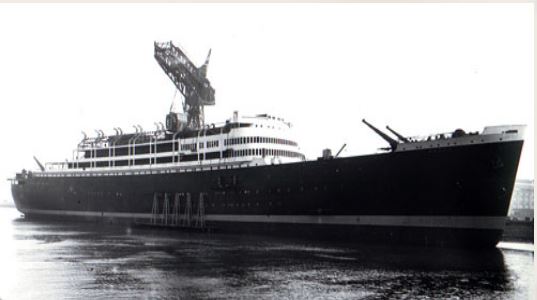Difference between revisions of "HMT Andes"
From Our Contribution
(Created page with "{{Infobox ship | image = File:HMT_Andes.jpg | caption = Harland & Wolff photo | image2 = File:.jpg | caption2 = | shipname = HMT Andes |...") |
(→Remarks) |
||
| Line 30: | Line 30: | ||
==Remarks== | ==Remarks== | ||
Built for mail, passenger and refrigerated cargo service from Southampton to Brazil and River Plate but was used as a troopship in World War II immediately on completion. In troop service she broke three speed records for long-distance voyages. First commercial voyage January 1948. Converted to full-time cruise liner 1960, based at Southampton. | Built for mail, passenger and refrigerated cargo service from Southampton to Brazil and River Plate but was used as a troopship in World War II immediately on completion. In troop service she broke three speed records for long-distance voyages. First commercial voyage January 1948. Converted to full-time cruise liner 1960, based at Southampton. | ||
| + | |||
Sold for breaking up at Ghent, Belgium, for £325,000; handed over 7 May 1971. | Sold for breaking up at Ghent, Belgium, for £325,000; handed over 7 May 1971. | ||
| − | |||
==Soldiers carried== | ==Soldiers carried== | ||
Revision as of 23:28, 22 December 2022
 Harland & Wolff photo | |
| File:.jpg | |
| History | |
|---|---|
| Name | HMT Andes |
| Owner | Royal Mail Lines Ltd |
| Builder | Harland & Wolff, Belfast |
| Yard number | 1005 |
| Launched | 7 Mar 1939 |
| Completed | 24 Sep 1939 |
| Out of service | 4 May 1971 |
| Fate | scrapped |
| General characteristics | |
| Type | Passenger ship |
| Tonnage | 25,689 tons |
| Length | 669'10" |
| Beam | 83' 6" |
| Depth | 29'3" |
| Propulsion | Twin screw |
| Speed | 21 knots |
| Capacity | 4,096 troops; or 528 passengers |
Remarks
Built for mail, passenger and refrigerated cargo service from Southampton to Brazil and River Plate but was used as a troopship in World War II immediately on completion. In troop service she broke three speed records for long-distance voyages. First commercial voyage January 1948. Converted to full-time cruise liner 1960, based at Southampton.
Sold for breaking up at Ghent, Belgium, for £325,000; handed over 7 May 1971.